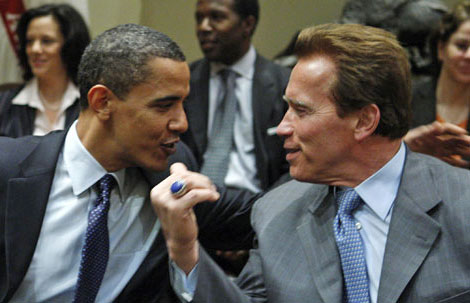The Urge to Speak
By Sesa Das | Jan 21, 2011

Political trash talking is not becoming of us. It never has been. It never will be. Therefore, I am greatly relieved by the sudden reemergence of civility in American public debate. Hopeful this trend will last. As a concerned and interested citizen I feel compelled to do my part, not only help the trend to last, but to actually elevate public debate. I suggest that the Vedic voice of ancient India may provide the necessary guidance.
We don’t often think of Rupa Goswami’s spiritually inspired teaching in terms of their applicability to achievement within the material world, but the principles he explains undoubtedly provide a strong foundation for material as well as spiritual success. Consider the urge to speak Rupa Goswami describes in his book Upadesamrita. The ability to control the tongue: to withhold errant thoughts or to eloquently express your ideas, not only qualifies or disqualifies one as a spiritual teacher or guru, but can make or break the career of a political leader.
Former California Governor Arnold Schwarzenegger confirmed this truth regarding the ability to hold one’s tongue in reply to a question asked by Los Angeles
Times Columnist Patt Morrison during an interview held just before he left office.
Morrison: Is there one thing that as a former governor you’ll be so thrilled not to have to do or say, laugh at or kiss or eat again?
Schwarzenegger: I think that when you represent yourself, you are much freer. You still can’t say everything that comes to your mind. But when you represent 38 million people, you’ve got to be a little bit more careful and considerate, even though I’m a loose cannon and I say sometimes things that I regret a little bit later on. But I think that you do live under that pressure, there’s no two ways about that. But I learned how to be disciplined — I only blew it a few times! Not many times. But I’m glad that I can start talking again exactly what comes to my mind.
After holding his tongue for seven years Schwarzenegger can now exhale and breathe easy. He made it, but political history is littered with examples of those who didn’t.
Of course, there is more to be gained through control of the tongue than mere political survival. Speech can harm, and thus we all bear great responsibility to carefully use the powerful urge to speak. The right to freedom of speech is a constitutional tenant that is the foundation of all public discourse in America, but judicial recognition that free speech may be subject to regulation has long been a guiding principle in American society. Freedom of speech doesn’t give you the right to irresponsibly incite imminent lawless action (e.g. a riot).
Similarly, in personal relationships harsh words are all too often the cause of agitating, continuing, and even expanding discord. In his July 23, 2010 posting on The Huffington Post Dr. Ronald Alexander, PhD, observed, “Sometimes, we should speak up in order to influence someone to change, but wise speech requires that we do so kindly and respectfully. Although it may seem well-meaning, being blunt or tactless with another is unkind and usually motivated not by a genuine desire to help that person but by the need to feel superior and be intimidating. Wise speech is gentle, never cruel or harsh. It enhances the situation by inviting everyone to improve it instead of shutting down the communication process.”
The “wise speech” spoken of by Dr. Alexander both incorporates proscriptions similar to those established by judicial process, and adds an all important element of voluntary self restraint. Such voluntary self-restraint is the calling card of the Vedic literatures. Alexander actually echoes the call in the Bhagavad-gita for voluntary self-restraint. “Austerity of speech consists in speaking words that are truthful, pleasing, beneficial, and not agitating to others, and also in regularly reciting Vedic literature.” (BG 17:15) But, Bhagavad-gita goes beyond just restricting speech. This text of the Bhagavad-gita describes what the best use of the urge to speak is and what the most valuable thing to hear is. It describes speech which elevates both the speech and the hearer both material and spiritual benefit.
Sage Sukadeva Goswami advised King Pariksit, who was a leader just as interested in the welfare of his citizens as the leaders should be today, as follows: “O descendant of King Bharata, one who desires to be free from all miseries must hear about, glorify [speak about] and also remember the Personality of Godhead, who is the Supersoul, the controller and the savior from all miseries.” (SB 2:1:5) Srila Prabhupada comments on the applicability of this text to society today:
“This process of hearing about and glorifying the Lord is applicable for everyone, whoever he may be, and it will lead one to the ultimate success in everything in which one may be engaged by providence. There are many classes of human beings: the fruitive workers, the empiric philosophers, the mystic yogis, and ultimately, the unalloyed devotees. For all of them, one and the same process is applicable for achieving the desired success. Everyone wants to be free from all kinds of fear, and everyone wants the fullest extent of happiness in life. The perfect process for achieving this, here and now, is recommended in the Srimad Bhagavatam, which is uttered by such a great authority as Srila Sukadeva Goswami. By hearing about and glorifying the Lord, all a person’s activities become molded into spiritual activities, and thus all conceptions of material miseries become completely vanquished.
When the urge to speak becomes not only civil, but elevates ultimate social welfare, that’s something to talk about!















